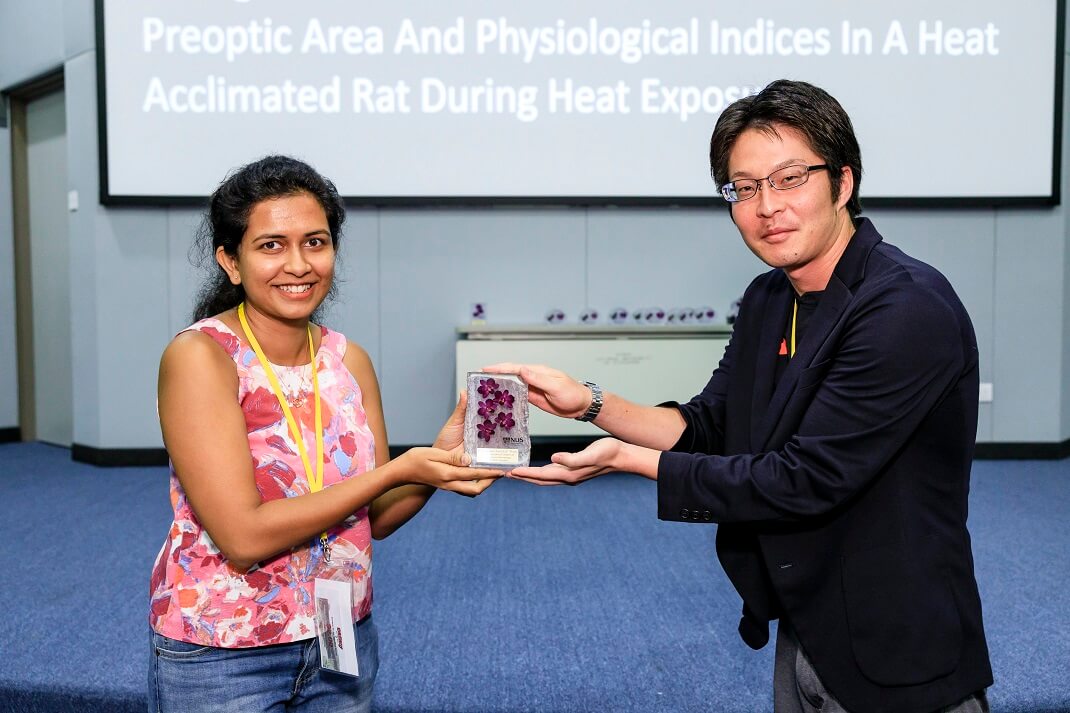Jan 14, 2020
Hikaru Nakagawa, a student in the doctoral program at the Graduate School of Community and Human Services, won the “Best Speaker Award (2nd Prize)” at the 14th International Congress of Physiological Anthropology 2019.
Keyword:INFORMATION
OBJECTIVE.
Hikaru Nakagawa, pursuing the third year of his doctoral program and belonging to the laboratory of Takayuki Ishiwata at the Graduate School of Community and Human Services, won the Best Speaker Award (2nd Prize) at the 14th International Congress of Physiological Anthropology 2019 (ICPA 2019), held September 24–27, 2019.

The Society of Physiological Anthropology aims to clarify the physiological peculiarity of humans from the perspectives of both time and space axes, based on keywords such as “environmental adaptability,” “technological adaptability,” “physiological polymorphisms,” “whole body coordination,” and “functional potentiality.” The International Congress of Physiological Anthropology is held every two years, wherein awards are presented to young researchers.
The Best Speaker Award, which Nakagawa won, is awarded to an excellent speaker selected from among researchers who deliver presentations at the “Young Investigators Session for Talks Presented” at the ICPA 2019. This year, eight out of 45 young researchers were chosen to make oral presentations, and the award winners were selected from among them.
The Best Speaker Award, which Nakagawa won, is awarded to an excellent speaker selected from among researchers who deliver presentations at the “Young Investigators Session for Talks Presented” at the ICPA 2019. This year, eight out of 45 young researchers were chosen to make oral presentations, and the award winners were selected from among them.
At the ICPA, Nakagawa delivered a presentation titled “Changes in Brain Monoamine Levels in the Preoptic Area and Physiological Indices in a Heat-Acclimated Rat during Heat Exposure.” This presentation dealt with his research on heat-acclimated rats, which he has been engaged in since the first year of his doctoral program. He discussed the instant changes that occur in brain neurotransmitters within the neural circuitry for thermoregulation and physiological indices. No reports were available in conventional studies regarding the changes in brain neurotransmitters and physiological indices in heat-acclimated rats that are unanesthetized and unrestrained. However, employing the microdialysis method that enables the measurement of brain neurotransmitters of unanesthetized and unrestrained rats, Nakagawa’s study shows that an increase of dopamine in regulating the body temperature in the neural circuitry is key for thermoregulation in heat-acclimated rats.
This is the first time a student from Rikkyo University received an award at the ICPA.
This is the first time a student from Rikkyo University received an award at the ICPA.
COMMENT
Hikaru Nakagawa, a third-year student in the doctoral program at the Graduate School of Community and Human Services:
I am pleased to report to you that I was able to win the Best Speaker Award (2nd Prize) at the ICPA 2019. I gave a presentation about the particular method of instantly measuring brain neurotransmitters and physiological indices in heat-acclimated rats; I have been engaged in conducting this research since my first year of the doctoral program. While many of the presentations were based on research mainly targeting humans, I feel honored to have received recognition from the observers for basic research performed using rats. It was my first time making an oral presentation in English, and I am profoundly grateful for all the advice I received from my academic supervisor, from the teachers within and outside the campus, as well as my fellow graduate students. As I am still inexperienced in many aspects such as answering questions in English, I aim to make an increased effort regarding both my research and presentation skills.